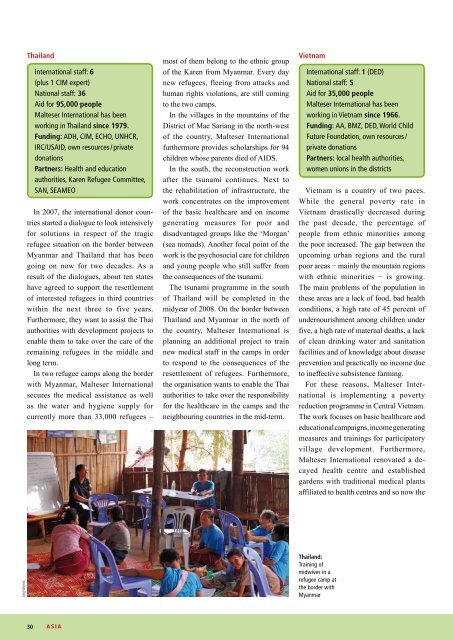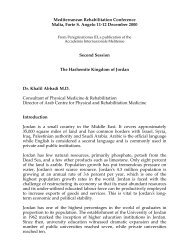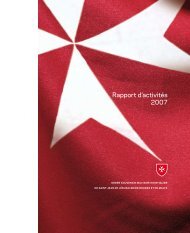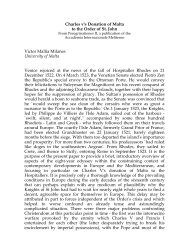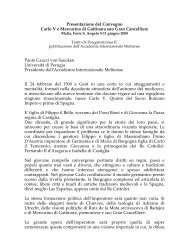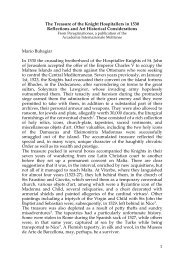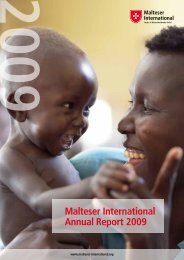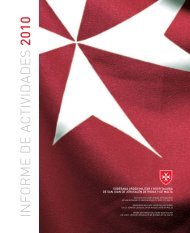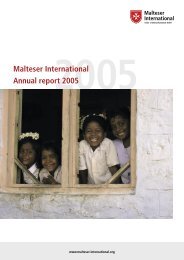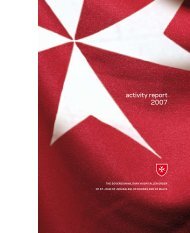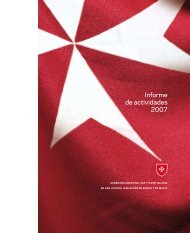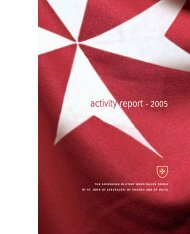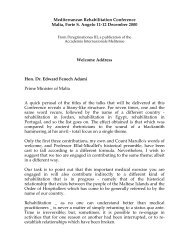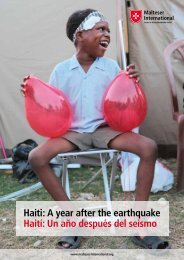Malteser International Annual Report 2007 - Ordine di Malta
Malteser International Annual Report 2007 - Ordine di Malta
Malteser International Annual Report 2007 - Ordine di Malta
Create successful ePaper yourself
Turn your PDF publications into a flip-book with our unique Google optimized e-Paper software.
Thailand<br />
<strong>International</strong> staff: 6<br />
(plus 1 CIM expert)<br />
National staff: 36<br />
Aid for 95,000 people<br />
<strong>Malteser</strong> <strong>International</strong> has been<br />
working in Thailand since 1979.<br />
Fun<strong>di</strong>ng: ADH, CIM, ECHO, UNHCR,<br />
IRC/USAID, own resources / private<br />
donations<br />
Partners: Health and education<br />
authorities, Karen Refugee Committee,<br />
SAN, SEAMEO<br />
In <strong>2007</strong>, the international donor countries<br />
started a <strong>di</strong>alogue to look intensively<br />
for solutions in respect of the tragic<br />
refugee situation on the border between<br />
Myanmar and Thailand that has been<br />
going on now for two decades. As a<br />
result of the <strong>di</strong>alogues, about ten states<br />
have agreed to support the resettlement<br />
of interested refugees in third countries<br />
within the next three to five years.<br />
Furthermore, they want to assist the Thai<br />
authorities with development projects to<br />
enable them to take over the care of the<br />
remaining refugees in the middle and<br />
long term.<br />
In two refugee camps along the border<br />
with Myanmar, <strong>Malteser</strong> <strong>International</strong><br />
secures the me<strong>di</strong>cal assistance as well<br />
as the water and hygiene supply for<br />
currently more than 33,000 refugees –<br />
most of them belong to the ethnic group<br />
of the Karen from Myanmar. Every day<br />
new refugees, fleeing from attacks and<br />
human rights violations, are still coming<br />
to the two camps.<br />
In the villages in the mountains of the<br />
District of Mae Sariang in the north-west<br />
of the country, <strong>Malteser</strong> <strong>International</strong><br />
furthermore provides scholarships for 94<br />
children whose parents <strong>di</strong>ed of AIDS.<br />
In the south, the reconstruction work<br />
after the tsunami continues. Next to<br />
the rehabilitation of infrastructure, the<br />
work concentrates on the improvement<br />
of the basic healthcare and on income<br />
generating measures for poor and<br />
<strong>di</strong>sadvantaged groups like the ‘Morgan’<br />
(sea nomads). Another focal point of the<br />
work is the psychosocial care for children<br />
and young people who still suffer from<br />
the consequences of the tsunami.<br />
The tsunami programme in the south<br />
of Thailand will be completed in the<br />
midyear of 2008. On the border between<br />
Thailand and Myanmar in the north of<br />
the country, <strong>Malteser</strong> <strong>International</strong> is<br />
planning an ad<strong>di</strong>tional project to train<br />
new me<strong>di</strong>cal staff in the camps in order<br />
to respond to the consequences of the<br />
resettlement of refugees. Furthermore,<br />
the organisation wants to enable the Thai<br />
authorities to take over the responsibility<br />
for the healthcare in the camps and the<br />
neighbouring countries in the mid-term.<br />
Vietnam<br />
<strong>International</strong> staff: 1 (DED)<br />
National staff: 5<br />
Aid for 35,000 people<br />
<strong>Malteser</strong> <strong>International</strong> has been<br />
working in Vietnam since 1966.<br />
Fun<strong>di</strong>ng: AA, BMZ, DED, World Child<br />
Future Foundation, own resources /<br />
private donations<br />
Partners: local health authorities,<br />
women unions in the <strong>di</strong>stricts<br />
Vietnam is a country of two paces.<br />
While the general poverty rate in<br />
Vietnam drastically decreased during<br />
the past decade, the percentage of<br />
people from ethnic minorities among<br />
the poor increased. The gap between the<br />
upcoming urban regions and the rural<br />
poor areas − mainly the mountain regions<br />
with ethnic minorities − is growing.<br />
The main problems of the population in<br />
these areas are a lack of food, bad health<br />
con<strong>di</strong>tions, a high rate of 45 percent of<br />
undernourishment among children under<br />
five, a high rate of maternal deaths, a lack<br />
of clean drinking water and sanitation<br />
facilities and of knowledge about <strong>di</strong>sease<br />
prevention and practically no income due<br />
to ineffective subsistence farming.<br />
For these reasons, <strong>Malteser</strong> <strong>International</strong><br />
is implementing a poverty<br />
reduction programme in Central Vietnam.<br />
The work focuses on basic healthcare and<br />
educational campaigns, income generating<br />
measures and trainings for participatory<br />
village development. Furthermore,<br />
<strong>Malteser</strong> <strong>International</strong> renovated a decayed<br />
health centre and established<br />
gardens with tra<strong>di</strong>tional me<strong>di</strong>cal plants<br />
affiliated to health centres and so now the<br />
Jörg Worms<br />
Thailand:<br />
Training of<br />
midwives in a<br />
refugee camp at<br />
the border with<br />
Myanmar<br />
30<br />
Asia


